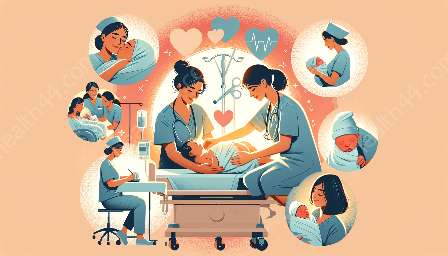Pregnancy and childbirth are profound experiences, but they can also bring significant challenges, particularly for high-risk mothers and their neonates. The field of maternal and newborn nursing plays a critical role in supporting and caring for individuals facing complex medical conditions, complications, and unique needs during this vulnerable time.
Understanding High-Risk Maternal and Neonatal Care
High-risk maternal and neonatal care refers to the specialized healthcare provided to pregnant women and newborns who face increased chances of complications due to pre-existing health conditions, pregnancy-related complications, or other risk factors. This can encompass a wide range of medical concerns, including but not limited to:
- Maternal medical conditions such as diabetes, hypertension, or autoimmune disorders
- Pregnancy-related conditions like preeclampsia, gestational diabetes, or placental abnormalities
- Fetal anomalies or developmental issues
- Multiple gestation pregnancies, such as twins or triplets
- Preterm labor and delivery
- Maternal substance abuse or mental health challenges
Given the complexity and potential severity of these situations, healthcare providers in the maternal and newborn nursing field must possess specialized knowledge, skills, and resources to effectively manage and address the unique needs of high-risk mothers and their newborns.
Challenges and Complications in High-Risk Pregnancies
High-risk pregnancies can present a myriad of challenges and complications, requiring vigilant monitoring and proactive interventions. Some of the common issues encountered in high-risk pregnancies include:
- Increased risk of preterm labor and delivery, leading to potential neonatal complications and long-term health concerns
- Higher likelihood of maternal and fetal medical emergencies, such as placental abruption or eclampsia
- Greater susceptibility to fetal growth restriction or intrauterine growth restriction (IUGR)
- Risk of congenital anomalies or genetic conditions that require specialized care and support
- Conducting thorough antepartum assessments to identify and monitor high-risk factors and potential complications
- Monitoring maternal and fetal well-being through regular fetal monitoring, non-stress tests, and biophysical profiles
- Administering specialized medications and treatments, such as antenatal corticosteroids for fetal lung maturation or magnesium sulfate for neuroprotection in preterm labor
- Providing emotional support, education, and guidance to high-risk mothers and their families regarding the management of their specific health concerns and the potential trajectory of their pregnancies
- Participating in the development and implementation of individualized care plans that address the unique needs of high-risk pregnancies and neonatal conditions
- Collaborating with other healthcare professionals to ensure seamless continuity of care and comprehensive support for high-risk maternal and neonatal cases
Furthermore, high-risk pregnancies often necessitate close collaboration among multidisciplinary healthcare teams, including obstetricians, neonatologists, perinatologists, and maternal-fetal medicine specialists. These collaborative efforts are essential for developing comprehensive care plans tailored to the specific needs of each high-risk pregnancy case.
Advanced Nursing Interventions in High-Risk Maternal and Neonatal Care
As integral members of the healthcare team, maternal and newborn nurses play a pivotal role in delivering advanced care and support to high-risk mothers and neonates. Nursing interventions in the context of high-risk maternal and neonatal care may involve:
Moreover, maternal and newborn nurses are instrumental in advocating for the rights and preferences of high-risk mothers and newborns, helping to ensure that their voices are heard, and their specific needs are addressed with compassion and respect.
Educational and Training Considerations for Maternal and Newborn Nurses
Given the multifaceted nature of high-risk maternal and neonatal care, nurses seeking to specialize in this area must obtain advanced education, training, and certifications to develop the necessary expertise and competence. Continuing education programs, specialized certifications in maternal and newborn nursing, and clinical experiences in high-risk obstetric units and neonatal intensive care units (NICUs) all contribute to the comprehensive preparation of nurses in this field.
Effective communication, critical thinking, and evidence-based practice are also paramount skills that high-risk maternal and neonatal nurses must cultivate to deliver optimal care and navigate complex healthcare scenarios. The ability to collaborate seamlessly within interdisciplinary healthcare teams and engage in compassionate, patient-centered care is equally essential for nurses providing high-risk maternal and neonatal care.
Integrating Technology and Innovation in High-Risk Care
Advancements in healthcare technology and innovation have significantly enhanced the capabilities of maternal and newborn nurses to provide exceptional care for high-risk mothers and neonates. From advanced fetal monitoring systems to telemedicine platforms that connect remote patients with specialized care providers, technology plays a pivotal role in managing and monitoring high-risk pregnancies and neonatal conditions.
Nurses in this specialty area continually embrace new technologies, staying abreast of the latest advancements in fetal monitoring, perinatal imaging, and neonatal resuscitation techniques. Embracing digital healthcare platforms and leveraging telehealth resources enable maternal and newborn nurses to extend their expertise and support to high-risk patients and families, regardless of geographic barriers or logistical constraints.
Supporting Families in High-Risk Maternal and Neonatal Care
High-risk maternal and neonatal care extends beyond the physical health aspects, encompassing the emotional, psychological, and social well-being of expectant mothers and their families. Nurses in this specialized area of care serve as advocates, educators, and empathetic listeners, guiding families through the complexities and uncertainties inherent in high-risk pregnancies and neonatal challenges.
Assisting families in accessing community resources, providing counseling and emotional support, and facilitating meaningful communication with healthcare providers are integral components of the holistic care framework embraced by maternal and newborn nurses. By fostering strong, trusting relationships with high-risk mothers and their families, nurses can alleviate anxiety, empower informed decision-making, and promote a sense of confidence and security during this challenging period.
Conclusion
High-risk maternal and neonatal care represents an intricate and essential domain within the broader field of maternal and newborn nursing. With its multifaceted demands, high-stakes interventions, and deeply personal connections with patients and families, this area of nursing requires unwavering dedication, advanced expertise, and a profound commitment to compassionate care.
By continuously advancing their knowledge, embracing emerging technologies, and honing their clinical and communication skills, nurses specializing in high-risk maternal and neonatal care can safeguard the well-being of at-risk mothers and their newborns, embodying the highest standards of nursing excellence in the face of complexity and uncertainty.


